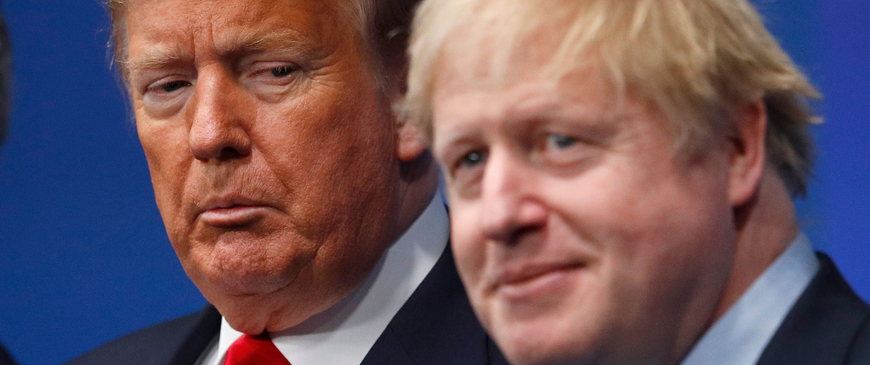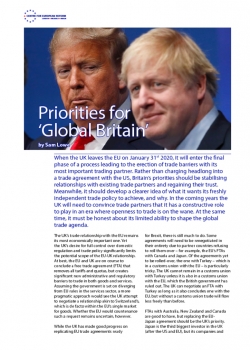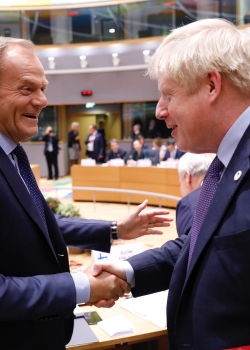
Priorities for 'Global Britain'
When the UK leaves the EU on January 31st 2020, it will enter the final phase of a process leading to the erection of trade barriers with its most important trading partner. Rather than charging headlong into a trade agreement with the US, Britain’s priorities should be stabilising relationships with existing trade partners and regaining their trust. Meanwhile, it should develop a clearer idea of what it wants its freshly independent trade policy to achieve, and why. In the coming years the UK will need to convince trade partners that it has a constructive role to play in an era where openness to trade is on the wane. At the same time, it must be honest about its limited ability to shape the global trade agenda.
The UK’s trade relationship with the EU remains its most economically important one. Yet the UK’s desire for full control over domestic regulation and trade policy significantly limits the potential scope of the EU-UK relationship.
At best, the EU and UK are on course to conclude a free trade agreement (FTA) that removes all tariffs and quotas, but creates significant new administrative and regulatory barriers to trade in both goods and services. Assuming the government is set on diverging from EU rules in the services sector, a more pragmatic approach would see the UK attempt to negotiate a relationship akin to Switzerland’s, which is de facto within the EU’s single market for goods. Whether the EU would countenance such a request remains uncertain, however.
While the UK has made good progress on replicating EU trade agreements ready for Brexit, there is still much to do. Some agreements will need to be renegotiated in their entirety due to partner countries refusing to roll them over – for example, the EU’s FTAs with Canada and Japan. Of the agreements yet to be rolled-over, the one with Turkey – which is in a customs union with the EU – is particularly tricky. The UK cannot remain in a customs union with Turkey unless it is also in a customs union with the EU, which the British government has ruled out. The UK can negotiate an FTA with Turkey as long as it also concludes one with the EU, but without a customs union trade will flow less freely than before.
FTAs with Australia, New Zealand and Canada are good to have, but replacing the EU-Japan agreement should be the UK’s priority. Japan is the third biggest investor in the UK (after the US and EU), but its companies and government view Brexit as a betrayal of trust. The British government will need to rebuild that relationship. Furthermore, the UK will need to work closely with Japan (from which it can learn a lot) in the World Trade Organization (WTO) and other forums in order to defend British interests and promote rules-based trade. Like Japan, the UK will be a mid-sized power amid tussling economic superpowers.
The UK must engage the US in trade negotiations immediately after Brexit, but drop its starry-eyed optimism. President Donald Trump is unpredictable and quick to take offence, and treats trade as akin to a protection racket – first he increases the threat, in the form of tariffs and instability, and then offers to shield you in exchange for payment. The UK will not get an easy ride just because of its so-called special relationship with the US. If the UK resists US demands, particularly in the area of agriculture and food hygiene, then concluding a comprehensive FTA could take years.
President Donald Trump is unpredictable and quick to take offence, and treats trade as akin to a protection racket – first he increases the threat, in the form of tariffs and instability, and then offers to shield you in exchange for payment.
Yet the UK may find a few trade-related morsels to provide political wins both for Trump and Prime Minister Boris Johnson before November’s US elections. For example, the British government could ask the US to exempt the UK from the tariffs levied against the EU, after the latter lost the WTO Boeing-Airbus dispute, in return for giving Trump something he wants. But Britain will need to tread carefully, and avoid being forced to pick sides in a trade war between the US and EU. It must also avoid being dragged into foreign policy positions it would not otherwise take on issues such as Iran and China by a president who is happy to use economic leverage to keep his allies in line.
The UK’s relationship with China may prove particularly tricky. Trump will probably demand Britain’s full support in his push against Chinese trade practices, in return for a US trade agreement. The UK should certainly back plurilateral initiatives by the EU, US and Japan to address industrial subsidies and forced technology transfer in China. But it should avoid obviously picking sides at a moment where the British economy is already vulnerable.
Elsewhere, the UK is entering a world in which it cannot rely on the WTO to settle trade disputes, due to the US’s refusal to appoint new members to the oraganisation’s appellate body. This problem, among many facing the WTO, is not one the UK can resolve by itself. But it can build good will by investing time, money and people in the committees and functions that keep the WTO ticking over day-to-day.
As for Britain’s long-term strategy, trade agreements should be more than just political trophies. They should have a purpose, whether economic or geopolitical, and work as an extension of overall government policy, not in isolation. The UK government needs to consider what it hopes to achieve, and how a trade agreement might help.
Inevitably this will involve choices and trade-offs. Is the UK prepared to make the domestic compromises necessary to seal an agreement? So far the government has struggled to produce answers. For example, UK policies designed to discourage immigration undermine efforts to make the UK attractive for investment and any aspirations to further liberalise trade in services. More positively, some of the UK’s large aid budget could be allocated to building trade capacity and transport and telecommunications infrastructure in the developing world, and supporting the creation of the African Continental Free Trade Area – steps which would promote economic growth and offer more opportunities for UK exporters.
Johnson has been an enthusiastic supporter of ‘Global Britain’ – an ambition to be a global leader, among other things in promoting free trade – which has become a mantra for Brexit supporters who argue that the UK’s voice will be more influential outside the EU. Expectations will need to be tempered. The UK has a positive contribution to make to the global trade system, but its approach should be born of pragmatism and realism, not arrogance and bluster. More than anything, the UK should take a breath, pause, and assess the reality of its situation and the role it can play – and then plan accordingly. Brexit means it is time for the British trade policy debate to grow up.
Sam Lowe is a senior research fellow at the Centre for European Reform.



